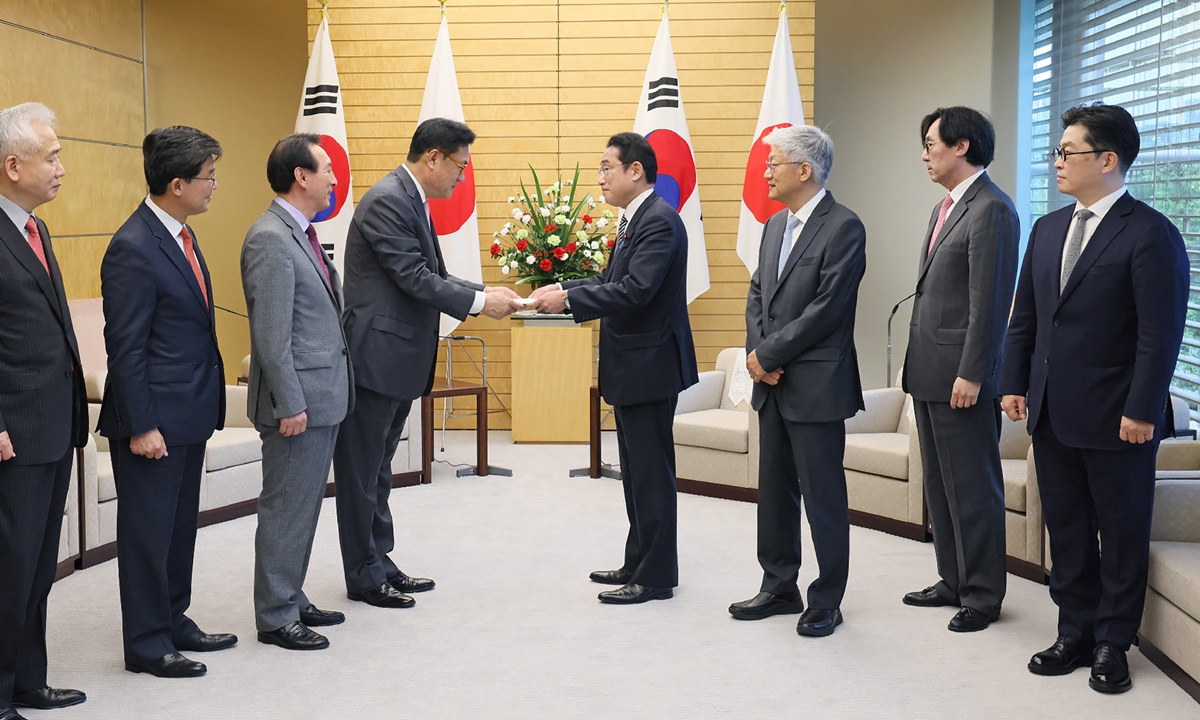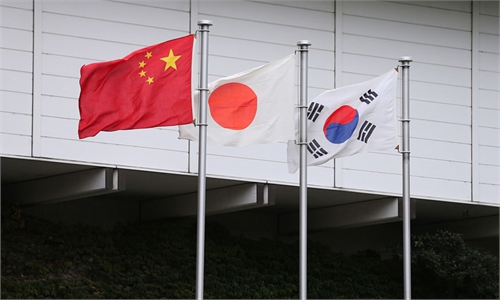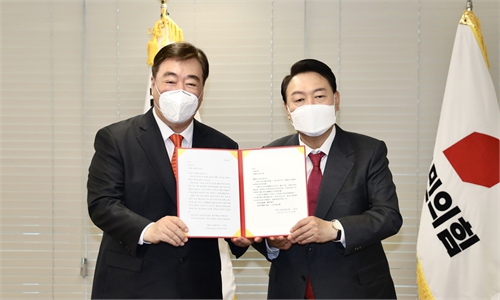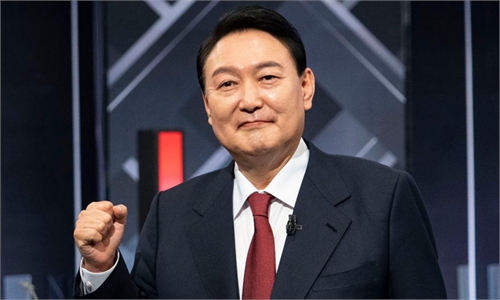Japan’s Kishida meets with Yoon’s delegation, shows 'eagerness' to drive S.Korea into Quad

Japanese Prime Minister Fumio Kishida (4th from right) receives a letter from Chung Jin-suk (4th from left), deputy speaker of South Korea's National Assembly and head of a delegation sent by South Korean president-elect Yoon Suk-yeol to Japan, at the prime minister's office in Tokyo on April 26, 2022. Photo:AFP
The delegation sent by South Korean president-elect Yoon Suk-yoel met with Japanese Prime Minister Fumio Kishida on Tuesday.
During the meeting, they agreed on seeking better Japan-South Korea relations. Improving ties is a necessary step for Yoon as he eyes a stronger alliance with the US on security, but there are many problems, including islet disputes with Japan that remain to be solved, analysts said.
Led by South Korea's Deputy National Assembly Speaker Chung Jin-suk, Yoon's delegation arrived in Tokyo on Sunday to meet with Japanese officials to improve ties between the countries. While meeting with Kishida, Chung delivered a personal letter from Yoon, Yonhap news reported on Tuesday.
Kishida noted that "Given that the rules-based international order is threatened, strategic cooperation between Japan and South Korea, as well as between Japan, the US and South Korea is needed more than ever." He also noted that "We have no time to spare in improving Japan-South Korea relations," Kyodo News reported.
Japan has responded to Yoon's signals to improve bilateral relations with concrete moves. The arrangement on a meeting between Kishida and the delegation is an example, Da Zhigang, director of the Institute of Northeast Asian Studies at Heilongjiang Provincial Academy of Social Sciences, told the Global Times.
Such interactions showed that both Yoon and Japanese leaders are making better relations a necessary agenda for the future. For Yoon, better relations with Japan are key for him to further strengthen the alliance with the US to deal with a variety of situations in the Korean Peninsula and Northeast Asia, Da said.
The expert noted that Kishida's remarks underscored Japan's eagerness to drive South Korea into the Quad mechanism - with Japan, India, Australia and the US, and to cooperate with their strategies, especially against the Russia-Ukraine crisis backdrop.
In an interview with the Wall Street Journal on Monday, Yoon said he will "positively review" South Korea's joining of the Quad, if invited.
On April 14, Yoon's office denied Japanese media reports that he had asked to attend a summit of the Quad as an observer. But some US and Japanese media have been keen on hyping the US urging South Korea to join the Quad since last year.
Although there may be some changes to China-South Korea relations after Yoon takes office, a balanced strategy to maintain good relations with China while seeking to boost its alliance with the US fits more to South Korea's national interests, Chinese analysts said.
So far, Chung's team has met with Japanese ministers for foreign affairs, economy, and defense. Japan is the second foreign country that Yoon has sent a delegation to after the US.
Sending delegations to other countries for consultations is a usual practice for South Korea's presidents-elect. The sequence of the visits to the US and then Japan underscored the importance Yoon attaches to seeking to rebuild the "US-Japan-South Korea triangle," analysts said.
However, there is still a long way to go for improved relations between South Korea and Japan. Da said that the confrontational sentiment between the two countries and historical issues, including issues such as "comfort women," wartime forced labor compensation, and disputes over the Dokdo islets, called Takeshima in Japan, are problems that Yoon and Japan need to solve.




